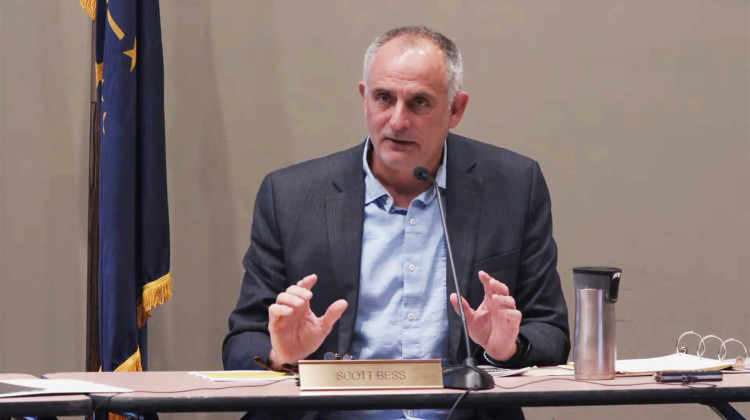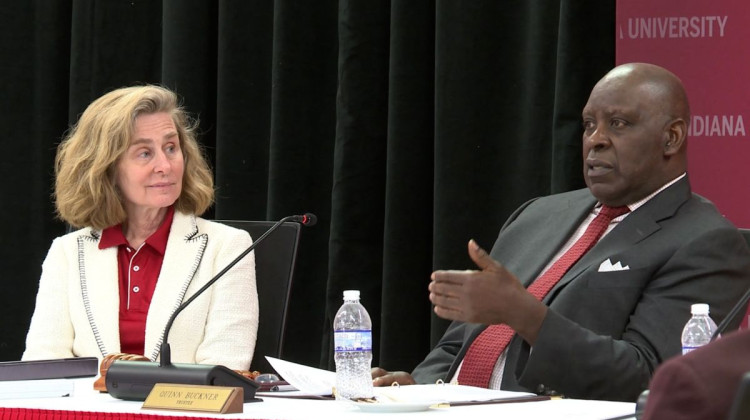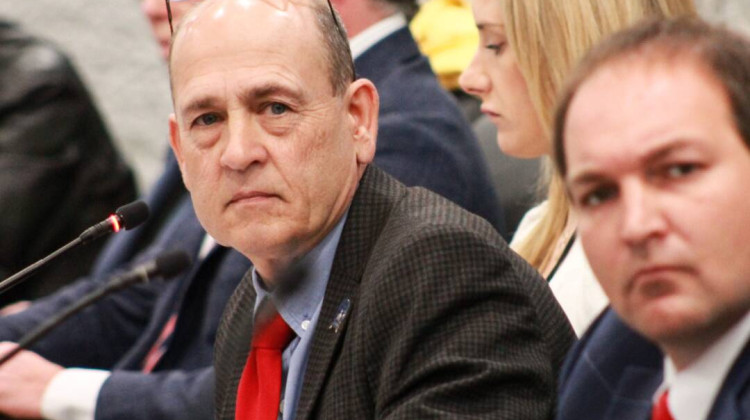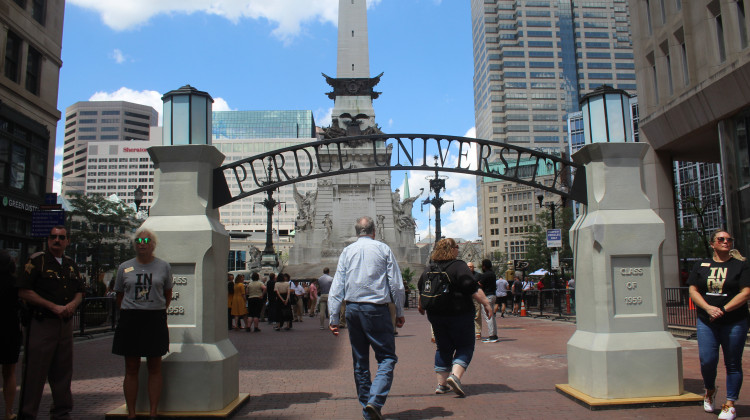
Scott Bess is the founding president of the Indiana Charter Innovation Center and a member of the Indiana State Board of Education. Bess speaks during a board meeting on Wednesday Sept. 11, 2024.
Indiana State Board of Education screenshotTraditional school districts receive local property tax dollars to pay for buildings and transportation. But Indiana’s charter schools don’t get those funds.
A newly created advocacy organization aims to change that in the upcoming legislative session. Those behind the Indiana Charter Innovation Center also seek to become the state’s “dedicated” association and support system focused solely on charter schools.
Scott Bess, the center’s founder, is a longtime charter advocate. He launched and replicated the charter high schools for adults, known as Excel Centers, and helped create the Purdue Polytechnic High Schools network.
He's also a governor's appointee on the Indiana State Board of Education.
Bess said charter leaders across Indiana have expressed the need for a centralized support system.
“They really wanted someone that could really help pull the charter sector together, create communities of practice, provide information to them, really provide the kind of services that they weren't getting before, and that they really had to try to find on their own,” Bess said. “That was the impetus to creating a center in the first place.”
About 37,000 students attended charter schools last year, inlcuding virtual charters, according to a state funding report.
Kim Reier has joined Bess at the center as vice president of strategy. She previously held similar roles at Purdue Polytechnic High School and Goodwill of Central and Southern Indiana.
The center’s goals include advocating for increased charter school funding and investing in innovative ideas for new schools.
The center plans to fund its mission through membership dues and philanthropy. Bess said there’s a balance to strike when determining how much to ask from schools.
“We'd love to see new and different models in the state,” said Bess, who left day-to-day operations of Purdue Polytechnic High School in the summer of 2023. “So whether it's, you know, specific themed schools or national models like big picture schools or Montessori schools, like having more of those things available.”
Charter schools are public schools that are privately managed. They are granted a contract to operate by one of several authorizers in the state.
Charter schools and funding gaps
Advocates for charter schools have long sought a share of local property tax dollars to better support students. Two years ago, more than two dozen Indianapolis charter schools demanded Indianapolis Public Schools share revenue from a proposed referendum so all city students would benefit. The district eventually cancelled the levy.
Critics, including some traditional public school supporters, argue that sharing property tax revenue with charters would strain traditional districts.
And some Indiana Democrats have criticized the state’s funding model for all schools.
Rep. Ed DeLaney (D-Indianapolis) said in October tuition support for all publicly funded schools — charter schools and vouchers for private schools included — is down.
“We have made, in my view, a conscious choice to turn our eyes away from education, specifically public education, and to downplay it,” DeLaney said Wednesday. “That’s not an accident.”
State funding support for charter schools increased slightly over the past 14 years by 0.4 percentage points, according to data DeLaney requested from the nonpartisan Legislative Services Agency. The report found that charter schools consistently received more state tuition support dollars on a per-student basis than traditional school corporations.
DeLaney has urged lawmakers to address funding concerns for all schools in the upcoming session. However, that may prove difficult as lawmakers craft the next two-year budget with less available funding.
Vouchers and charter schools
Vouchers are expected to be a major focus of the 2025 legislative session, driven in part by Governor-elect Mike Braun’s push to expand school choice for families. Senate and House leadership have indicated they will discuss increased access to public funds for private, parochial, and nonreligious schools.
Bess said that vouchers won’t hinder the center’s goals for charter schools. He said they all want money to follow the child to their school.
“We're really saying the exact same thing for charter schools, other except, other than saying we want a whole bunch more state money, it's we want access to the local money,” Bess said.
In 2001, lawmakers passed a law creating charter schools. In the past five years enrollment grew by 12 percent at brick and mortar charter schools and fell by 42 percent for virtual charters.
Bess said charter school enrollment is somewhat stagnant, and more saturated in Indianapolis and Gary.
But there’s room to grow in rural and smaller cities, he said.
“We'd love to see a more uniform spread across the state,” Bess said. “Because we, again, fundamentally believe that all types of students deserve, and parents deserve some type of choice.”
Rachel Fradette is the WFYI Statehouse education reporter. Contact Rachel at rfradette@wfyi.org.
 DONATE
DONATE






 Support WFYI. We can't do it without you.
Support WFYI. We can't do it without you.